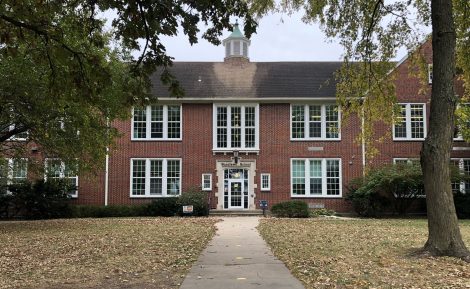Haskell president rescinds October directive to student editor, calling action ‘incorrect’ and promising not to interfere with free speech again

photo by: Jared Nally
Jared Nally is the editor in chief of the student newspaper at Haskell Indian Nations University.
Months after sending out a directive telling the editor of the student newspaper what he could and could not publish, the president of Haskell Indian Nations University has rescinded his memorandum.
In an undated letter that just reached student journalist Jared Nally on Wednesday, Haskell President Ronald Graham wrote that the university “took an incorrect approach” in sending out the Oct. 16 directive.
“Accordingly, I commit that Haskell will not interfere in the affairs of the Indian Leader or impede the free expression rights of individual students at Haskell,” Graham wrote.
In October, Graham sent Nally a memorandum that said “you will NOT” attack any student, faculty member or staff member with letters or in public, make demands of any governmental agency while claiming to represent the student newspaper, attempt to countermand decisions of Haskell personnel or record anyone at Haskell in interviews unless first advising them and receiving their permission.
“Henceforth, you will conduct yourself in accordance with the Haskell Student Code of Conduct — now and in the future; and you will treat fellow students, University staff, and University officials with appropriate respect,” Graham wrote in October. “Failure to do so, may result in disciplinary action.”
Groups such as the Foundation for Individual Rights in Education (FIRE), Native American Journalists Association and Student Press Law Center denounced the directive, calling it a violation of the First Amendment.
Nally heard nothing more from the university about the directive until Wednesday, when he received an email from Graham with the new letter rescinding his previous statements.
In his email to Nally, Graham said he had sent his response letter to the Bureau of Indian Education on Nov. 20, 2020, but that he just learned Wednesday that it was never sent to Nally, due to “an administrative mishap.” Graham apologized for the delay in delivery.
“I think it’s a very egregious oversight,” Nally said of the delay. “It seems like it fell through the cracks in bureaucracy.”
Nally said he felt that the university and the Bureau of Indian Education were likely more concerned about administrative processes than with him.
“If it wasn’t just about their processes and making sure that they have all their ducks in a row … there would have been more engagement with me and they would have made sure that I got that,” he said.
The entire fall semester, Nally said the staff of the Indian Leader continued to work but that he couldn’t tell his staff members when they would get paid. Nally had not been able to access the paper’s funding because the group had not been recognized by the university.
Graham addressed this in his letter.
“I instructed my staff to review the status of the Leader’s annual recognition process to ensure continued access by the Leader to its Student Bank account and Haskell resources,” he wrote.
Nally said he reached back out to the student bank last Friday and that he had good communication with it Monday. He was able to receive a list of bank statements from 2020, find out how much money was in the newspaper’s account and retroactively pay all his writers and photographers for the fall semester.
In his newest letter, Graham explained that the Oct. 16 letter originated “because of Haskell staff members’ concerns and complaints regarding certain methods employed to obtain information. They perceived these methods to be needlessly aggressive and, at times, deceitful.”
Graham then went on to write that the Oct. 16 directive was “an incorrect approach to address those concerns.”
Nally said he was optimistic about the future of the Leader and was looking forward to recruiting staff and being able to pay them.
Nally said he was also optimistic about “moving forward with the momentum of giving free speech rights to our students.”







